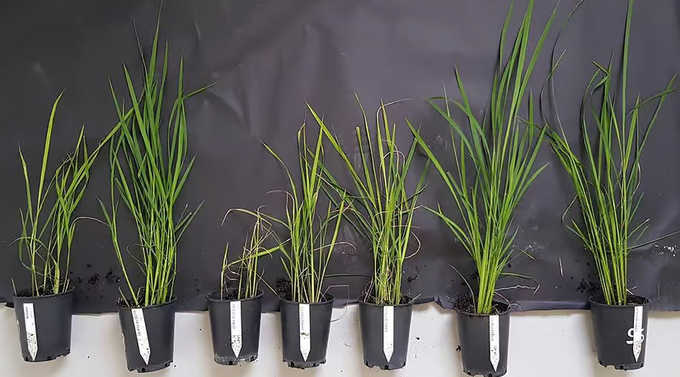May 15, 2025 | 00:38 GMT +7
May 15, 2025 | 00:38 GMT +7
Hotline: 0913.378.918
May 15, 2025 | 00:38 GMT +7
Hotline: 0913.378.918

Various rice plants, both control plants and mutants, between three and four weeks after inoculation. Photo: IRD / Laurence Albar
The development of the resistant variety, described in a new paper in the journal Plant Biotechnology, is just the first step towards generating resistant, locally adapted varieties for food producers in Africa.
Rice yellow mottle virus (RYMV) is spread by mammals and insects and direct leaf-to-leaf contact. In Africa, the majority of farm plots are less than one hectare in size, and between 10-100% of the rice harvests are regularly lost to the virus.
“The only real protection is to develop rice varieties that possess a resistance gene against RYMV, which would make the plant invulnerable,” says Dr Yugander Arra of Heinrich Heine University Düsseldorf (HHU), Germany, and lead author of the study.
Mutations in just 3 genes – RYMV1, RYMV2, and RYMV3 – are already known to achieve resistance. For example, the resistant form rymv2 naturally occurs in Oryza glaberrima varieties – a domesticated African rice. But unfortunately it produces poor yields.
“This resistance trait is attributable to the loss of a gene function that is not essential. If we switch the gene off completely, the plants behave normally. However, as a result of the loss of the gene function, they are resistant to the virus,” says Dr Wolf Frommer, who heads The Institute for Molecular Physiology at HHU.
The mutation is rare in the high-yielding Oryza sativa, which is by far the most cultivated rice species in Africa, so the researchers wanted to see whether resistance could be introduced to a variety of O. sativa using the CRISPR/Cas genome editing method.
Their results confirm that disrupting the RYMVR gene in the Kitaake variety, a Japonica rice variety, confers resistance without penalising its high yield, at least under greenhouse conditions.
“The next step will be to edit [the mutation] in elite varieties that are better adapted to rice culture in rainfed lowland and irrigated areas of Africa, where rice production is particularly affected by RYMV disease,” the authors write.
“Subsequently, field trials will be required to validate that resistance is maintained under the local conditions in Africa, and to evaluate possible penalties in the relevant agro-ecosystems.”
cosmosmagazine

(VAN) Fourth most important food crop in peril as Latin America and Caribbean suffer from slow-onset climate disaster.

(VAN) Shifting market dynamics and the noise around new legislation has propelled Trouw Nutrition’s research around early life nutrition in poultry. Today, it continues to be a key area of research.

(VAN) India is concerned about its food security and the livelihoods of its farmers if more US food imports are allowed.

(VAN) FAO's Director-General emphasises the need to work together to transform agrifood systems.

(VAN) Europe is facing its worst outbreak of foot-and-mouth since the start of the century.

(VAN) The central authorities, in early April, released a 10-year plan for rural vitalization.

(VAN) Viterra marked a significant milestone in its carbon measurement program in Argentina, called Ígaris, reaching 1 million soybean hectares measured.